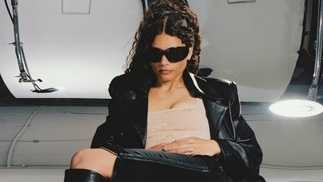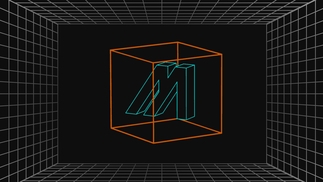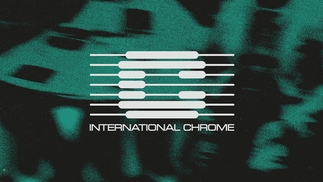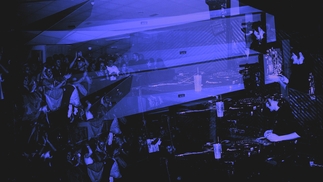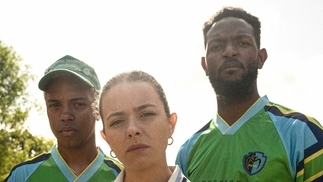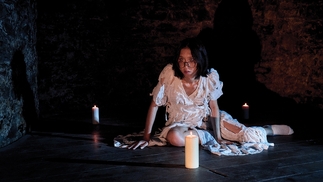BLOOD ON THE TRACKS
Fake Blood talks to the press for the first time about his new album
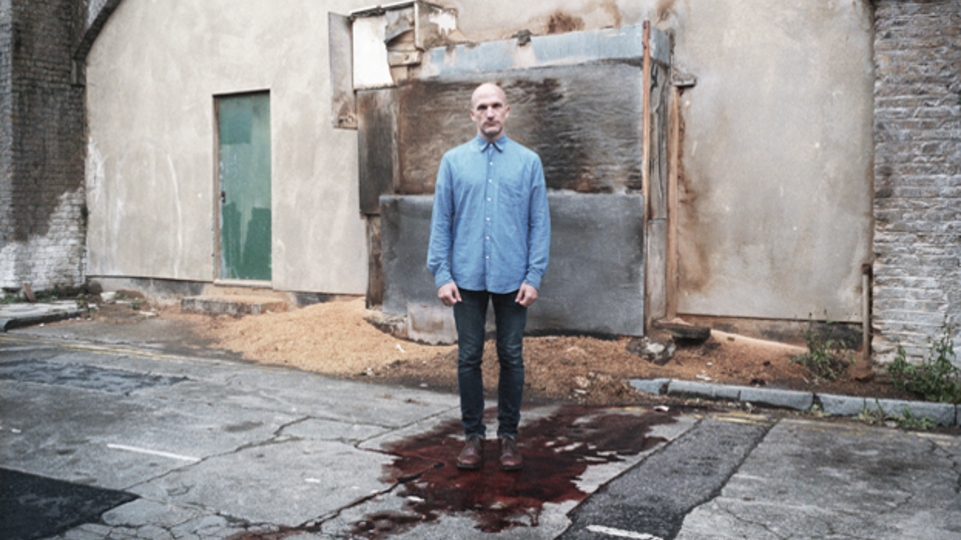
When ‘Mars’ by Fake Blood was doing the rounds as a DJ promo in the summer of 2008, the speculation as to who was behind the old skool-tinged electro track reached fever pitch. Was this some new 21-year-old kid from London? Was it so-and-so? Why did nobody know who it was by?
“One person thought it was Tiësto,” says Theo Keating, aka DJ Touche, aka Fake Blood. “You couldn’t tell which ones were serious guesses and which ones weren’t, it was like names out of a hat really. Random stabs in the dark. I thought it was pretty obvious myself, but apparently not.”
Somebody even set up a blog dedicated to guessing who had created ‘Mars’. If a major label spent a million dollars on a marketing campaign, it wouldn’t have created anywhere near the same buzz as the mystery and hype surrounding the track. But all Theo did was not talk about the record at all.
“It was totally unintentional on my part, it was completely accidental, none of that was engineered,” he tells DJ Mag. “No management, PR, nothing. It was just me sat here, deciding to do no interviews, no press, answering no questions. Everything else was created by the public out there – none of it was by design at all.
“By doing no press, no marketing, no promo — nothing — I got more hype and reaction and interest than anything I’ve ever done,” he continues. “People afterwards would say to me ‘I want to do something like that’, and I’d say ‘I wouldn’t recommend it as an approach, because now it’s been done’. It was just a set of circumstances, the stars just kind of aligned.”
HIP-HOP ROOTS
This happy accident kicked off the Fake Blood moniker, a pseudonym that Theo had used first to remix a track by the Black Ghosts, his main production project at the time.
His refusal to talk about the project fuelled the speculation throughout 2008 as ‘Mars’ blasted into the mainstream Belgian and Dutch charts, and was heralded as the standout record in many of the lists of the year put together by DJs, electronic music blogs and other media outlets.
Fake Blood has since become one of the biggest names in the global electro scene. It all seems a far cry from his (equally successful) debut project in the 1990s — The Wiseguys. The duo — Theo and Paul Eve — released an album of party hip-hop and trip-hop on Wall Of Sound, ‘Executive Suite’, before Eve went off to form Bronx Dogs, leaving Theo to pursue The Wiseguys solo.
He hit paydirt with ‘Start The Commotion’ and then happy-hop cut ‘Ooh La La’, snapped up for ads for Mitsubishi and Budweiser (featuring the beer brand’s three frogs) respectively. The latter crashed into the UK charts at No.2 on re-release.
Theo’s DJ sets at the time included house and techno and drum & bass as well as hip-hop, often lumped together under the catch-all genre name at the time — big beat. “Some of it was people who made hip-hop making dance tunes, or people applying hip-hop production techniques to different tempos,” he recalls. “It wasn’t so much that I turned my back on hip-hop — it was a gradual shift.”
Theo has also been a graffiti artist since his teens, and is still painting now. “People associate graffiti with hip-hop, but the two are completely fucking separate,” he believes. “Fuck all that ‘four elements’ shit. You can be into Sepultura and be into graffiti, you can be into Richie Hawtin and be into graffiti — you can be into whatever you want. It’s got nothing to do with hip-hop.”
He cites the rampant commercialism since the Millennium as making him fall out of love with hip-hop for a bit, but says he still loves it. “The music and the production informs everything I do.”
After The Wiseguys he started releasing DJ Touché tracks on Norman Cook’s Southern Fried imprint (‘The Paddle’, ‘She’s At The Club’ etc), which also released the two Black Ghosts albums he put together with singer Simon Lord. In response to DJ Mag’s question about why spooky electronicists the Black Ghosts weren’t bigger, he says:
“We didn’t really play gigs live, and maybe people wanted a band? But we weren’t up for touring around in a van for three months to play sticky-floor indies. We did a lot of DJ gigs all around the States and Australia and all over the UK, and that was good. Who knows? I don’t try to analyse it, I still think it’s good.”
After ‘Mars’ landed, Fake Blood became Theo’s main focus and he’s made a great name for himself as an underground electro artist. He says it’s not in his genes to make a big room EDM track, because he has to enjoy what he’s doing.
“My cringe-gland would just go into overdrive, and I’d put the brakes on it pretty quick,” he smirks. “Each to their own, but it’s not me. I’m not one to be standing with my arms out-stretched to the crowd giving it the whole DJ messiah thing — I’m just more heads-down and play records.”
CELLS
His new album, ‘Cells’, has him talking to the media about Fake Blood for the first time, and he tells DJ Mag that he didn’t have any over-arching concept or agenda with the album. “I just wanted to make a collection of tracks where each one should be its own self-contained autonomous thing, it was just what happened one after the other in parallel,” he says. “I’d make several tracks concurrently and bounce between them.”
From opener and recent single 'Yes/No' with its chopped-up familiar classical music refrain, through a Daft Punky 'Airbrushed' and into a phantasmagorical, oblique 'Phantom Power', this is a discerning album full of quality. Gothic electro anthem 'Soft Machine' and a soundtracky 'London' also stand out — none of your predictable big room EDM bangers here.
'Let It Go' almost has a crunked-out call & response bassline, and stripped-down crazy electro-funker 'Sideshow' almost has a 'Sting Ray' motif. DJ Mag asks Theo about the dry humour in some tracks, to which he says: “Some tunes are like Rorschach tests [inkblot patterns] where the person who made it intends one thing, and the person who hears it hears another.”
We ask if ‘All In The Blink’ was consciously influenced by ‘70s soft rock act Supertramp, an era Daft Punk were also influenced by. “I dig that era, the very end of the '70s soft rock period, the piano work from that time and melodies,” he says. “It’s not trying to be like Supertramp, but that’s one thing that I was listening to at that time, 1979 keyboards and stuff. I could name 20 different things I was probably unconsciously influenced by.”
It’s his Black Ghosts cohort Simon Lord doing the vocals on ‘All In The Blink’ and a couple of other tracks on ‘Cells’ — “He gets my music, we complement each other well” — with Theo praising the way the former Simian man uses imagery and phrases that are quite dark sometimes and complement the tunes he gives Lord to write to.
SUSPIRIA
'Cells' is every bit as quality as Boys Noize's recent long-player. Theo says he doesn’t care if people just download a couple of tracks from the album (“You have to live with that”), and begins talking about other music he’s working on in different styles.
“I did a thing at the British Film Institute (BFI) a few months ago where I took the [1977 cult Italian horror] film Suspiria and I stripped away all the existing music and rebuilt a lot of the scenes which had music and sound effects,” he explains. “I used my own sourced sound effects, so that it seemed like I’d only taken out the music, when in fact I’d silenced the whole thing and reconstructed it all.
“Suspiria is a favourite of mine, it’s a classic horror movie that’s well-loved and adored,” he continues. “People really love it, but it doesn’t get shown so much. It’s a really beautiful film — it’s not a straight-up horror, it’s like a nightmarish fairy story, it’s really odd.
The original music, by an Italian [prog rock] band called Goblin, is great, but it doesn’t occur that often in the film and there’s a lot of space in there. So I made about 20 pieces of music, and on the night I DJ’d and played them in at all the right places, hitting the cues.”
Saying how pleased he was to get a standing ovation from the BFI crowd at the end of the performance after putting such a huge amount of work into it, he expresses the desire to do more soundtrack shows. “It’s based on different atmospheres, really enjoyable to make,” he says. “Making it was really exciting, but then seeing people really loving it... they weren’t people who knew who I was in the main, they were people who’d come cos they loved the film.”
